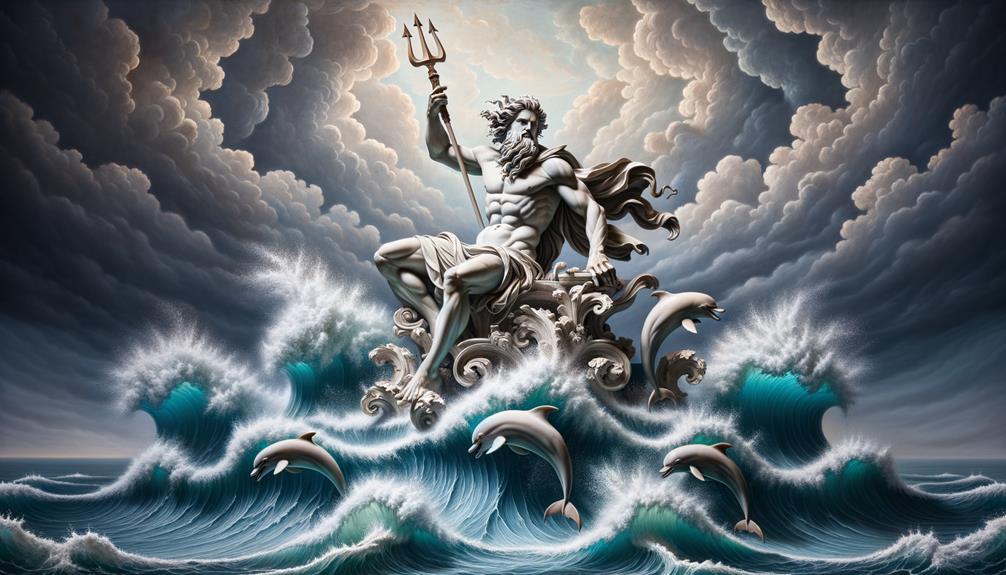During my tender years, I would frequently find myself mesmerized by the turbulent ocean waves clashing vigorously against the rugged shoreline. Their raw, untamed energy invoked images of Poseidon, the formidable Greek Sea God, brandishing his iconic trident. As an eminent member of the esteemed Twelve Olympians, Poseidon's purview extended beyond the capricious seas, encompassing the earth's tremors as well as the elegance of equine creatures.
Within the Greek pantheon, Poseidon exudes an alluring aura of mystery and awe-inspiring power. His potent influence resonates in the thunderous uproar of a storm, the exhilarating jolt of an earthquake, and the tranquil splendor of an untethered horse galloping with abandon. The deeper we delve into the captivating narratives of Poseidon's exploits, and his profound impact on Greek civilization and beyond, the more we find ourselves ensnared in his oceanic currents, yearning to unravel the secrets of this elusive deity.
An exploration of Poseidon's lore not only enriches our understanding of Greek mythology but also underscores his significance in modern culture. From inspiring literary works like Percy Jackson to featuring in popular video games like 'God of War', Poseidon's influence is far-reaching and palpable.
The Power of Poseidon in Greek Mythology
Poseidon's tales serve as an intriguing voyage into the heart of Greek mythology, illuminating our understanding of ancient beliefs, traditions, and narratives. His influence reverberates in the tumultuous outbursts of a storm, the spine-tingling sensation of an earthquake, and the peaceful elegance of a horse in full gallop. The deeper we explore his influence on Greek culture and beyond, the more we find ourselves drawn into the pull of his tides, intrigued by the mystery of this enigmatic god.
Poseidon's Modern Influence: Real-World Examples
Poseidon's influence extends beyond the ancient world into modern culture. His tales have inspired a host of modern literature, notably the 'Percy Jackson' series, where he is portrayed as the father of the protagonist. In the realm of video games, Poseidon features prominently in 'God of War', a popular game that delves into Greek mythology.
The Allure of Poseidon: A Deity Worth Exploring
As we continue to uncover the depths of Poseidon's lore, we find ourselves ensnared in his oceanic currents, yearning to understand more about this intriguing deity. Whether it's through literature, games, or simply exploring Greek mythology, Poseidon's tales offer a captivating journey into a world of gods, heroes, and ancient civilizations.
Final Thoughts
In conclusion, the stories of Poseidon, the Greek Sea God, beckon us to explore the mystique and power that surrounds this ancient deity. His tales not only enrich our understanding of Greek mythology but also lay the groundwork for modern interpretations and adaptations. By diving into Poseidon's world, we are not just exploring ancient myths, but also understanding their profound influence on our contemporary culture.
Poseidon's Origin and Significance

Delving into Ancient Greek Mythology: The Mighty Poseidon
In the fascinating world of ancient Greek mythology, we meet Poseidon, the powerful Olympian god whose influence reaches far beyond his known dominion of sea and storms. Born from Cronus and Rhea, Poseidon's roots are deeply embedded in the core of Greek mythology. His legacy, etched in the annals of ancient Greek art, echoes his dominion as the god of the sea.
Poseidon: A Leading Deity on Mount Olympus
On the celestial abode of Mount Olympus, Poseidon occupied a prestigious seat as a primary deity. His role as a protector of seafarers and guardian of numerous Hellenic cities showcases his status and importance. His ability to conjure springs with a mere flick of his trident exemplifies his dominance over all water forms. His close ties with horses and earthquakes enhance his sphere of influence, earning him the moniker of 'Earth-shaker'.
Poseidon's Strategic Role in Epic Greek Narratives
Poseidon's participation in the Trojan War underscores his strategic presence in Greek epic tales. His affiliation with the mythical island of Atlantis further affirms his rule over the seas. Poseidon's chthonic aspect symbolizes his profound ties with the earth, highlighting his importance beyond his marine territory. An exploration of Poseidon's roots and significance offers deep insights into the vast power of this prominent Greek deity.
To appreciate Poseidon's influence fully, immerse yourself in Greek mythology, and you'll encounter his presence in numerous tales and artworks. His story is a testament to the rich tapestry of Greek mythology, bringing to life an ancient world of gods, heroes, and epic adventures.
In essence, understanding Poseidon's origins and significance sheds light on the encompassing power and influence of this remarkable Greek god. Your journey into his world will leave you with a deep appreciation for the richness of Greek mythology, its characters, and its narratives.
Worship and Festivals of Poseidon
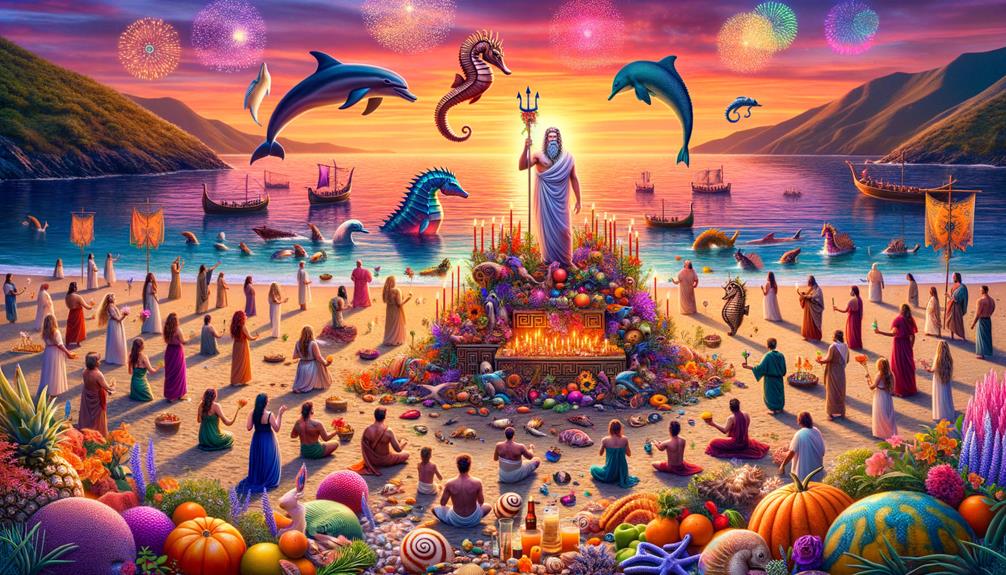
Exploring Poseidon's Worship and Festivals
Diving deep into Poseidon's rich history and expansive influence, we unearth the profound reverence he commanded amongst his worshippers. This admiration shone brightly through the multitude of festivals and rituals dedicated to him. With grandeur and awe, these events were more than mere words of praise – they were grand spectacles. Let's delve into the fascinating world of Poseidon's worship and honouring rituals.
Poseidea: A Tribute to the Greek Sea God
The Poseidea, a significant festival held in Athens, serves as a remarkable example of the Greeks' deep-seated respect for Poseidon, the revered Greek sea god. Temples were erected, and sacrifices made in his honour, transforming the event into a spectacular display of devotion. Bulls – potent symbols of strength and fertility – were frequently sacrificed. This act served as a plea for Poseidon's protection and favour. Poseidon's influence seeped into Greek myths as well. He often appeared as a divine interventionist, aiding the Greeks in their battles against the Trojans.
Isthmian Games: A Testament to Poseidon's Influence
Moving beyond the Poseidea, we arrive at the Isthmian Games. Held at the Isthmus of Corinth, these games celebrated Poseidon's honour, further amplifying his profound influence. These were not just sporting events. They were significant religious ceremonies, drawing athletes and spectators from various Greek city-states. Poseidon's son, the chief god of the sea, was revered during these games, adding another layer to the legacy of Poseidon.
Legends and Myths Surrounding Poseidon
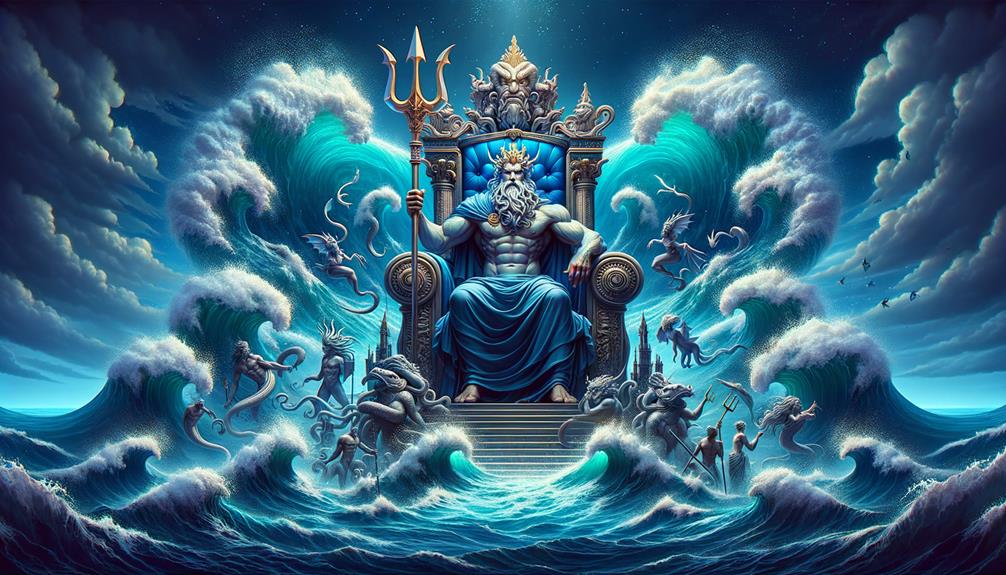
Unveiling the Grandeur of Poseidon: The Mighty Sea God in Greek Mythology
Embark on a fascinating journey into the heart of mystique and mythology, as we delve into the compelling stories of Poseidon, the potent sovereign of the sea and protector of voyagers. Recognized by his signature trident, Poseidon is often portrayed astride a chariot pulled by the unique, fish-tailed equines, known as the hippokampoi. As the majestic Poseidon, he ruled not only the vast oceans but was also venerated as the earthquake god, aptly titled the Earth Shaker.
One enthralling legend recounts a heated rivalry between Poseidon and Athena, with each deity striving to become the patron of a city. Poseidon struck the earth with his trident, causing a spring to gush forth, but Athena's olive tree was adjudged more beneficial. Thus, the city was christened Athens to laud her generosity.
Poseidon and the Enigmatic Atlantis: A Confluence of Divine Influence and Human Devotion
The divine figure of Poseidon is intrinsically linked to the enigmatic Atlantis, amplifying its allure and intrigue. It is believed that the Atlanteans revered Poseidon as their Earth Holder, seeking his divine protection and favor. This captivating fusion of divine power and human devotion underlines the profundity of the legends and myths that enshroud Poseidon, the Greek god of the sea.
*“Poseidon, the Greek god of the sea, stands as a symbol of elemental might and divine authority, his legends a testament to his power and majesty.”*
These tales, brimming with timeless allure and rich detail, offer an immersive exploration of Poseidon's power and influence, painting a vivid picture of his elemental strength and divine supremacy. This intriguing narrative underscores the importance of Poseidon in Greek mythology, providing a compelling portrayal of his omnipresent influence in the ancient world.
Poseidon's Influence in Modern Culture
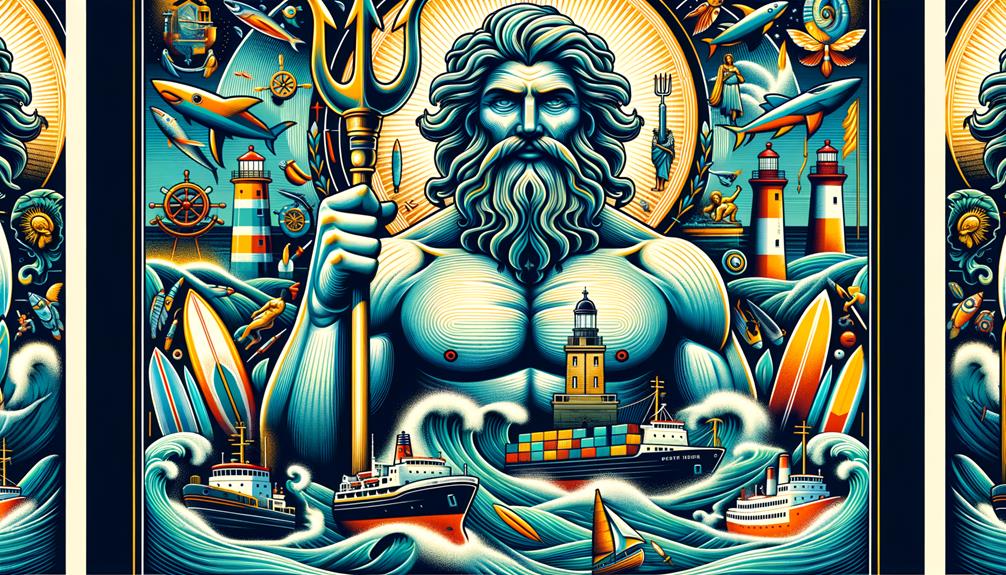
Poseidon: A Greek God's Resounding Resonance in Contemporary Culture
Poseidon, the revered ancient Greek god, leaves a powerful imprint on our contemporary culture, his majestic presence reverberating through time. You'll encounter the grandeur of Poseidon immortalized in statues dotting the landscapes of diverse countries, from brisk Sweden to historical Greece. Additionally, his character is intricately woven into contemporary narratives about the sea. As the sovereign of the seas, Poseidon's association with oceans is irrefutable.
Poseidon's Commanding Presence: A Testament to Ancient Artistry
In the pantheon of Greek deities, Poseidon is renowned for his commanding presence, a characteristic reflected in ancient Greek art. This powerful image of him continues to be an influential aspect of modern culture.
Poseidon's Trident: Symbol of Unmatched Power
Poseidon ascended as the ruler of all waters, his trident acting as a testament to his unparalleled power. This symbol continues to resonate in the cultural fabric of today, signifying strength and authority.
Poseidon's Many Roles: God of the Sea, Earthquakes, and Horses
Countless modern tales portray Poseidon as more than just the god of the sea. His roles extend to being the deity of earthquakes and horses, highlighting his expansive range of influence in various facets of life.
Poseidon and Nature: A Symbol of Uncontrollable Power
Historically, Poseidon was revered as the god of natural forces. This association has morphed over time, positioning him as a representation of nature's unpredictable strength in the face of human attempts to control it.
The enduring influence of Poseidon in today's culture is a testament to the lasting impact of Greek gods. His character, attributes, and tales continue to captivate and inspire, securing his position in modern mythology. This underscores how deeply the narrative of Poseidon, the Greek god of the sea, is woven into our collective consciousness.
The vibrancy of Poseidon's influence underscores how ancient mythology can enrich and shape modern culture. It demonstrates how the past continues to influence the present, sparking interest and fascination with these timeless figures. The spellbinding tales and symbolism of Poseidon offer a rich tapestry of cultural references that continue to captivate and inspire us, reinforcing his enduring relevance in our contemporary world.
The Artistic Depictions of Poseidon
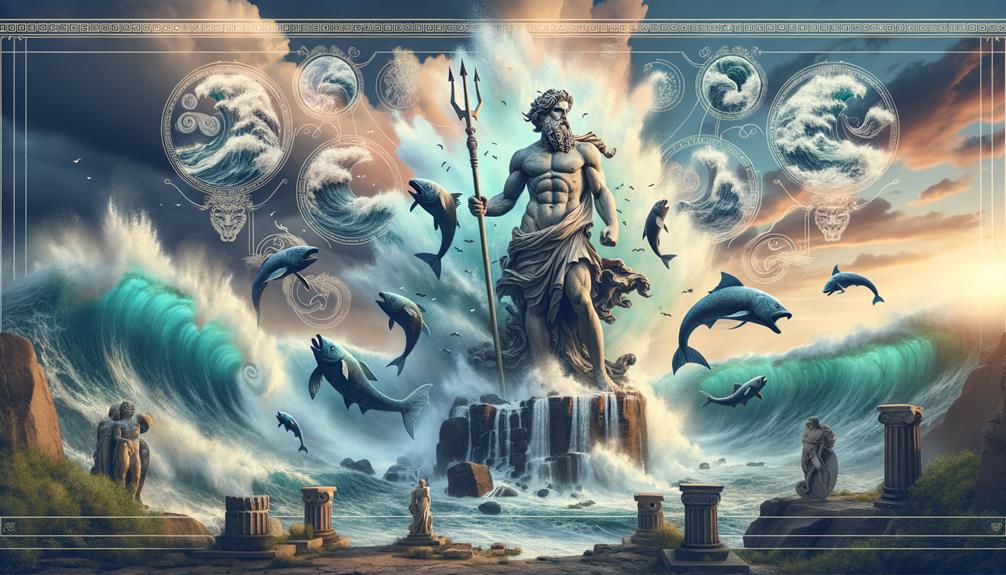
Poseidon in Art: An Exploration Across Ages
In the rich tapestry of art, the embodiment of Poseidon, the mighty Greek sea god, stands as a compelling image, transcending time. The dynamic portrayal of his iconic trident and chariot has been vividly recreated throughout the ages, establishing his enduring legacy in Greek mythology.
Poseidon: The Majestic Sea God
Often, we observe Poseidon adorned with a dark beard, symbolizing his wisdom and age. He stands tall, a three-pronged spear – his trident – firmly grasped in his hand. This trident is not just any weapon; it is a testament to his unrivaled dominion over the ocean. His chariot, drawn by mystical sea creatures, further emphasizes his profound connection with the sea.
Symbolism in Poseidon's Artistic Depictions
| Feature | Significance | Representation |
|---|---|---|
| Trident | Power over the Sea | Three-pronged fisherman's spear |
| Chariot | Connection with Sea & Horses | Chariot drawn by horses or dolphins |
| Dark Beard | Age & Wisdom | Poseidon's dark beard |
| Ocean Floor | His Kingdom | Dramatic scenes set on the ocean floor |
Each aspect of Poseidon's depiction, from the trident to the chariot, weaves a rich narrative. Together, they paint a vivid portrait of a deity as formidable, unpredictable, and powerful as the sea itself.
Poseidon's Legacy in Greek Mythology: A Lasting Influence
The artistic representations of Poseidon serve as a timeless testament to his enduring influence in Greek mythology. Each element, each stroke, contributes to bringing alive the narrative of a god who is as much a part of the sea as the sea is a part of him. The portrayal of Poseidon is not just a visual feast but also an engaging exploration of ancient mythology.
Remember, engaging with art, especially when it involves diving into the depths of mythology, is an enriching experience. So, the next time you come across an artistic depiction of Poseidon, take a moment to appreciate the intricate details and the rich symbolism. It's not just about viewing art; it's about experiencing a piece of history.
Concluding Thoughts
The artistic depictions of Poseidon are far more than mere illustrations. They are a journey into the heart of Greek mythology, presenting a dynamic deity whose persona is as captivating as his dominion over the ocean. These powerful portrayals of Poseidon remain a testament to his enduring legacy, reminding us of the fascinating world of ancient Greek mythology.
Frequently Asked Questions
Is Poseidon Good or Bad?
Is Poseidon Good or Bad?
Understanding Poseidon's Dual Nature
Dissecting the character of Poseidon, it's rather intricate. Indeed, he's known for his volatile temper, yet he also stands as the guardian of seafarers. This suggests that he's a complex blend of both good and bad, neither being entirely virtuous nor unconditionally malevolent.
Poseidon: The Tempestuous Deity
Poseidon, the mighty god of the sea, has a reputation for his fiery temper. Legends are filled with stories of his wrath, causing storms and earthquakes to express his displeasure. In this light, Poseidon could be seen as a 'bad' character. However, it's essential to remember that all characters, mythological or not, have their shades of grey.
The Protector of Seafarers
Conversely, Poseidon is also revered as the protector of seafarers, a beacon of hope for those navigating the treacherous seas. This benevolent side paints him in a more positive light. The seafarers of ancient Greece, for instance, would pray to Poseidon for safe passage, highlighting his crucial role as a protector.
Conclusions: A Blend of Virtue and Vice
In conclusion, Poseidon is a fascinating study in contrasts. His character encapsulates both the turbulent and the tranquil. He's neither purely virtuous nor entirely wicked – instead, he's a compelling blend of both. So, is Poseidon good or bad? Well, he's a bit of both, which makes him such an engaging character!
*Remember, when diving into the world of mythology, it's all about perspective. Each character, just like Poseidon, offers us an opportunity to explore the complexities and nuances that make up the human condition.*
Is Poseidon a Villain or a Hero?
Poseidon: Neither Villain nor Hero, but a Complex Deity
In the realm of Greek mythology, Poseidon, the god of the sea, presents a fascinating character study. It would be an oversimplification to label him a hero or a villain. This deity, much like the sea he controls, is unpredictable, powerful, and filled with depth.
Poseidon's Dual Nature: A Mix of Noble and Destructive Traits
Poseidon's character is a fascinating blend of both noble and destructive aspects. His actions in various Greek myths exemplify this complexity. For example, he is known for creating horses, a noble and useful creature. Yet, he also uses his powers to cause destructive sea storms. This dual nature makes him difficult to categorize simply.
Recommendation: Dive Deeper into Poseidon's Story
For those interested in exploring Poseidon's multi-faceted character, I would recommend delving into his tales. Books such as "Poseidon: Earth Shaker" by George O'Connor provide a comprehensive insight into his character, illustrating his unpredictability and power.
What Is Poseidon's Weakness?
Understanding Poseidon's Predominant Weakness
In the realm of Greek mythology, Poseidon's weaknesses are often attributed to his impetuous temperament and passion for vengeance. This triggers a cognitive fog, impairing his decision-making capabilities. Moreover, his profound love for his family makes him an easy target for deceit and manipulation.
Diving Deeper into Poseidon's Vulnerabilities
Poseidon's impulsive behavior often sends him on a roller coaster of emotional highs and lows. Such instability can cloud his judgment, leading to decisions that might not serve his best interest. For instance, his feud with Athena over the city of Athens is a classic example of his rashness overshadowing rational thinking.
His family ties, while a testament of his deep-seated loyalty, also serve as his Achilles' heel. This intense bond often leaves him exposed to manipulation. As seen in the mythological tale of Theseus, King Minos was able to exploit Poseidon's love for his son, Androgeus, to fulfill his vengeful intentions.
A Closer Look at Poseidon's Character Flaws
To sum up, Poseidon's weaknesses are deeply rooted in his emotional volatility and strong familial attachments. These traits, while endearing in some aspects, often lead to actions that compromise his position and authority. While these flaws make him a fascinating character in Greek mythology, they also serve as a reminder of the dangers of letting emotions dictate decisions and the risks of being too trusting.
Through the lens of modern psychology, Poseidon's traits could be seen as a cautionary tale about the importance of emotional stability and discernment in relationships. It's a valuable lesson worth learning, both in the context of ancient myths and our everyday lives.
What Are 10 Facts About Poseidon?
Let me unveil ten fascinating truths about Poseidon, the ancient Greek deity that's sure to pique your interest. Poseidon, the almighty ruler of the seas, storms, earthquakes, and the equestrian world, held a significant place in the pantheons of ancient Greece. His mighty trident could conjure springs, a testament to his vast powers.
In the epic Trojan War, Poseidon was a staunch ally of the Greeks. His intervention was instrumental in turning the tide in their favor, making him a revered figure among the Greek warriors. The ancient hero Odysseus was not so fortunate, however. Crossing paths with Poseidon, Odysseus faced the deity's wrath for his hubris, a classic example of divine punishment in ancient Greek mythology.
Poseidon's influence stretched even to the lost city of Atlantis, as legends link him to this enigmatic civilization. His worship was widespread in ancient Greece, as people revered him as a paramount deity, highlighting his importance in Greek mythology.

